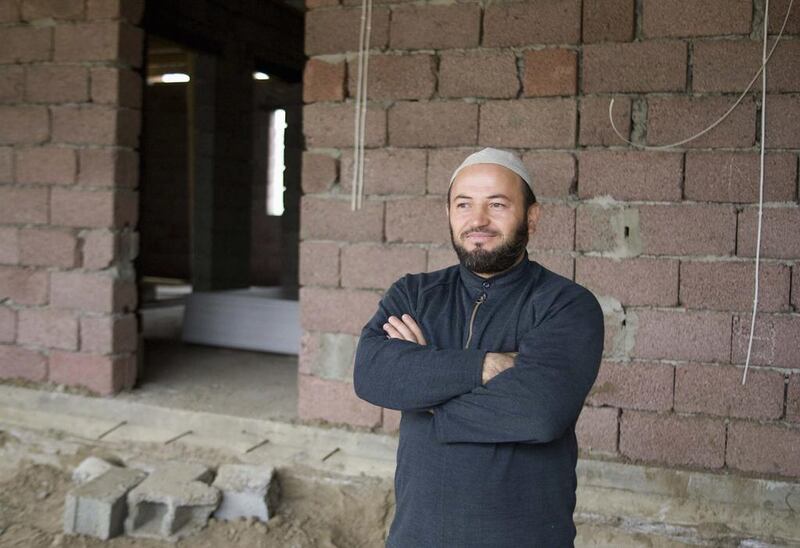NOVOSASITLI, Russia // A scrawny 15-year-old this summer became the first from his deeply religious Muslim village in Russia’s southern Dagestan province to die fighting alongside rebels in Syria.
Some regard him as a martyr for joining the rebels in the fight against Syrian President Bashar Al Assad, who is supported by Russia.
Moscow now fears that hundreds of Russian-born militants it says are fighting in Syria will return experienced in warfare to join an insurgency in Dagestan and its other North Caucasus provinces by militants fighting for an Islamic state.
Violence in the region claims lives almost daily. Fifteen men from Novosasitli alone have died in shootouts with Russian forces in the past four years, residents say.
Analysts say fighters could also try to strike during the 2014 Winter Olympics in February in nearby Sochi. President Vladimir Putin, who has staked his reputation on the Games, has said militants returning from Syria pose “a very real” threat and signed off on a law this month to jail any who come home.
“The militant groups did not come out of nowhere, and they will not vanish into thin air,” Mr Putin said in September.
In Novosasitli, where walls are tagged with graffiti supporting rebels fighting for an Islamic state, villagers say at least eight out of 2,000 inhabitants have gone to Syria.
“There are whole brigades of our boys there,” village council member Akhmed Khaibulayev said.
Three of them were arrested by Russian forces on their way home via a land route crossing the border from Azerbaijan back into Dagestan, he said, but five have returned, underscoring the ease with which Russians travel to and from Syria.
“They are at home now, waiting for when the security forces come for them,” Mr Khaibulayev said.
Meanwhile, anxious parents try to hold back their sons.
“A father knows his son. I told him to leave his passport with me. When he refused, I took it away,” a man dressed in a beige tunic and skullcap said, asking not to be named for fear of reprisal by Russian security forces.
Despite his warnings, his 23-year-old son, whom he boasts knew the Quran by heart, left two months ago for the battlefield. “I don’t know if he will come back,” he said.
A photograph, sent by fighters, of the scarred, skinny corpse of the local 15-year-old killed there is still being passed around the village. Stones are placed over his eyelids.
In the comment thread under a photo of the smooth-chinned youth on a Facebook page he is called a hero and a martyr.
“He went to Syria because he couldn’t stand that Assad and his army were killing children,” said a villager who, according to other residents, also fought in Syria.
The boy had studied in Egypt before joining other Russian-born militants in Syria, and his family only learned he had gone to fight there after his death, villagers said.
The sons of Novosasitli grew up playing “cops and insurgents” in the streets. Russian rule is tenuous, with residents describing police as the enemy and the state as corrupt, and saying they manage their own affairs under Sharia.
Some have had relatives, classmates or neighbours join Islamist insurgency in Russia, rooted in separatist wars in neighbouring Chechnya.
The militants adhere to Salafism, an ultra-conservative branch of Sunni Islam. They do not have the support of all Salafis – some disapprove of their racketeering ways or do not view their attacks on police and officials as a lawful jihad.
The battle raging in Syria is different. It is widely seen in the majority Sunni Muslim region as a “true” holy war against Mr Al Assad’s Alawite-dominated government.
But voicing that support for Syrian rebels in Russia is dangerous. A popular young imam who had raised funds to help Syrian refugees has fled to Turkey after coming under pressure from law enforcement. Media with links to police claimed he was inciting youths to join the conflict.
The doors of a newly built, emerald-domed madrasa he ran in Novosasitli now stand shut, empty of students.
“There’s no obligation for Muslims to go from here to Syria,” says Abdurakhim Magomedov, 71, a Salafi scholar in Novosasitli. “But if someone wants to go, no one can stop him.”
Russia’s protection of Mr Al Assad, with weapons supplies and diplomatic backing, has left many angry at Mr Putin.
“Muslims the world over revile Putin for his support of Assad,” said Dzhabrail Magomedov, one of about two dozen residents of Novosasitli who studied at a religious school in Damascus.
This summer the Chechen-born Caucasus insurgent leader Doku Umarov urged fighters to use “maximum force” to sabotage the Olympics. His cry was echoed by fighters in Syria, who called on Muslims in the North Caucasus to wage jihad at home rather than joining them.
Russia has a history of recent militant attacks. Suicide bombings in the past two years killed dozens at a Moscow airport and subway. More than 380 people, mainly schoolchildren, were killed in the siege of a primary school in Beslan in 2004.
Empathy for fellow Sunni Muslims caught in the bloodshed in Syria is especially sharp among Chechens, who see in it echoes of their own suffering in two wars for secession from Russia.
“They also killed our mothers, brothers and grandparents,” said Akhmed, a 21-year-old Chechen, in the village of Berdykel, near the provincial capital, Grozny. “We want to help. They are our Muslim brothers.”
In response, Chechen authorities have banned wakes for anyone killed in Syria, and Muslim clerics speak out in mosques and schools, casting the war as a political struggle not a religious one.
* Reuters





